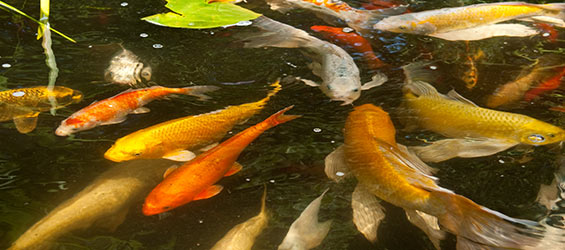
Feeding time is easily the most enjoyable part of the day for both koi and pond-keeper. Boisterous and full of personality, hungry koi are often indulged and overfed by doting koi-keepers. Learn how to avoid this common practice to maintain healthy koi and a beautiful pond environment.
Resist Overfeeding
Though cherished as family pets, interaction between koi and koi-keeper is limited. Unlike fuzzy and furry
pets that you can pet or play with, “bonding” with koi occurs mainly during feeding time. However, “spoiling” your koi with extra food leads to a host of short term AND long term pond water-quality issues.
Pond Pollution
Excess or uneaten food due to overfeeding immediately compromises pond aesthetics, as puffy, waterlogged pellets crumble and scatter unsightly particles. As these particles break down further, they pollute pond water, releasing
nitrogenous waste materials (ammonia, nitrite, and nitrate) as well as the algal nutrient phosphate. Over time, buildup of these pollutants creates chronic conditions negatively affecting koi health and fuels aggressive, persistent algae growth.
Automate and Schedule Proper Portions
Avoid serving “one large meal” to your koi. Instead, feed your koi several times a day with just enough food they can completely finish in a few minutes. Automatic fish feeders offer a simple and consistent feeding solution whether you are away during the day or on vacation. Simply program desired amount and frequency and then enjoy greater feeding convenience and better pond water quality.
|